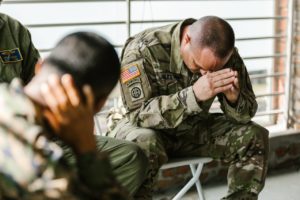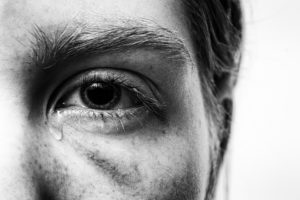PTSD is pretty much a household name these days, but I don’t like the term, “disorder.” Throughout my career, I have worked with military veterans and survivors of abuse. I don’t see this as a disorder, but an injury. It is a normal response to abnormal events. Many survivors have harsh expectations of themselves, ignoring the effects of the injury.
 This is the hard work – the “rehab.” You find out you are not alone in your recovery and rehab. You can have a very unique healing process, which is yours, not someone else’s. We work together to find the way that works best for you. There is also an accompanying piece.
This is the hard work – the “rehab.” You find out you are not alone in your recovery and rehab. You can have a very unique healing process, which is yours, not someone else’s. We work together to find the way that works best for you. There is also an accompanying piece.
Moral injury is more often than not a part of PTSD. It is the damage done to a person’s conscience or moral compass when that person perpetrates, witnesses, or fails to prevent acts that transgress one’s own moral beliefs, or values.
Within the context of military service, particularly regarding the experience of war, “moral injury” refers to the lasting emotional, psychological, social, behavioral, and spiritual impacts of actions that violate a service member’s core moral values and behavioral expectations of self or leadership failure.
It is perceived as a betrayal of what’s right, by a person in authority. This can cause a deep wound to the soul that damages a person’s identity, sense of morality, and relationship with society. This can happen in school or church or other groups when a minister or someone in authority, like an elected official or teacher violates you and your trust or is found out to be a perpetrator of a crime like sexual assault.
Moral injury does not, by its nature, present itself immediately. Some will experience questions of moral injury days after an incident; for many others, difficulties will not surface for years. The trauma of a type and severity that cause PTSD are likely to cause moral injury, too. This does not mean treating PTSD will “treat” moral injury.
Treatment of moral injury must be defined by the individual according to their beliefs and needs. Outlets for acknowledging and confronting moral injury include talk therapy, spiritual dialogue, art, writing, discussion & talking circles, prayer groups, church, and more. Many people discover it in these types of settings.
 For veterans, the injury can come from using deadly force in combat and causing the harm or death of civilians, knowingly but without alternatives, or accidentally. Giving orders in combat that result in the injury or death of a fellow service member. Failing to provide medical aid to an injured civilian or service member. Returning home from deployment and hearing of the executions of cooperating local nationals.
For veterans, the injury can come from using deadly force in combat and causing the harm or death of civilians, knowingly but without alternatives, or accidentally. Giving orders in combat that result in the injury or death of a fellow service member. Failing to provide medical aid to an injured civilian or service member. Returning home from deployment and hearing of the executions of cooperating local nationals.
Failing to report knowledge of a sexual assault or rape committed against oneself, a fellow service member, or civilians. Following orders that were illegal, immoral, and/or against the Rules of Engagement or Geneva Convention. A change in belief about the necessity or justification for war, during or after one’s service
The following is a poem written by a veteran.
Basic Training
“There are things your country asks
and you do them. Maybe because you
were raised on war stories. The glory.
Your dad told ‘em, your uncle, a
movie hero. For God and Country, you
heard them boast. The Glory. The sound
of in-coming, cannons, mortars, small arms,
helicopters and the rumble of bombers, drowned
the glory.
Then Ichabod: The Glory of the Lord
has departed the mission. And you know
you are going to hell for what you’ve done.”
Kowalski sniffed back tears. In the VA
recovery group, he asks, “Why would
any of you think it is a good idea that I stop
drinkin’ and druggin’? You have no idea
what kind of hell I could unleash.”
Reading this poem reminded me of a client of mine, who was molested in her church. She could not recall the event, but her symptoms told her she was sexually assaulted. As we worked together, she told me she did not want to find out who violated her.
She feared she would become self-destructive. In our developmental years, we often assume blame or responsibility for someone we trust or admire when they do something that hurts us. Your therapist must be very sensitive to this.
 Therapists, counselors, social workers, and clergy are often at the front lines of addressing moral injury; however, the larger community can also take part. Moral injury can remain undetected for years, isolating you from society, and even close friends.
Therapists, counselors, social workers, and clergy are often at the front lines of addressing moral injury; however, the larger community can also take part. Moral injury can remain undetected for years, isolating you from society, and even close friends.
Consider that moral injury affects, and is affected by individual moral codes and the community you live and work in. In the case of military veterans, moral injury stems in part from feelings of isolation from civilian society. Moral injury, then, is a burden carried by very few and known by even fewer.
The woman and the veteran above both struggled with the same thing. Each of them suffered from knowing someone that they loved and respected who did something completely out of the range of acceptability. For the soldier, the mission became unrecognizable. Those who led him into harm’s way actually applauded those who broke the rules of engagement. The woman could not accept that a minister could sin against her and God in such a horrible way.
Although the core features of moral injury overlap with symptoms and common features of PTSD, it is possible to experience moral injury and not meet the criteria for PTSD. In addition, distress from morally injurious events can lead to different symptom profiles than distress from traumatic events that elicit a fear-based reaction.
For example, one study found that perpetration-based events (events where someone perpetrated an act outside of one’s values) were associated with more re-experiencing, guilt, and self-blame than life-threatening traumatic events. Reporting perpetration is also associated with more thoughts and actions of self-harm, even after adjusting for PTSD, depression, and substance use.
Experiencing moral injury in addition to PTSD is associated with more severe symptoms of depression suicidal intent and behaviors. Some therapists that have evaluated core features of moral injury (e.g., guilt and shame related to trauma) have also found these to be associated with more severe PTSD, depression, and functional impairment.
It can be difficult for patients to share morally injurious events because of the feelings of guilt and shame associated with them. Therapy may be the first time patients share the story, so they may be concerned about a therapist’s reactions.
 They may wonder “Am I being judged? Is my therapist disgusted with me? Is this too much for my therapist to handle?” Therapists need to convey an accepting, non-judgmental, empathic stance. It is also important for therapists to stay alert to their presumptions about perpetration, morals, values, and spirituality.
They may wonder “Am I being judged? Is my therapist disgusted with me? Is this too much for my therapist to handle?” Therapists need to convey an accepting, non-judgmental, empathic stance. It is also important for therapists to stay alert to their presumptions about perpetration, morals, values, and spirituality.
Moral injury may lead patients to believe that they do not deserve to feel better which could negatively affect how much patients engage in and comply with treatment. Acting out in other facets of life such as in work or relationships may be clues to a moral injury that has not yet been disclosed. Thus, therapists should assess such beliefs and address them in therapy.
It is common for people with PTSD to have experienced more than one traumatic event in their lifetime, so it is possible that the traumatic event(s) processed in therapy were not the ones that involved trauma-related guilt. It is also common for patients to not share their worst traumatic event for fear of being judged, subsequently “testing the waters” with another event.
In this case, a patient may not have had the opportunity to gather corrective information that could help to alleviate their guilt. There is also evidence that some individuals may need additional treatment to address moral injury-specific concerns (e.g., self-forgiveness) that may require more honed and specialized treatment.
Moral injury can occur in reaction to a traumatic event in which deeply held morals or values are violated. The resulting distress may lead to PTSD, depression, and other disorders in which feelings such as guilt, shame, betrayal, and anger are predominant, although these feelings may occur in the absence of a formal disorder.
The attention that moral injury has received over the past decade shows that the concept resonates with individuals who have experienced a morally injurious event as well as with clinicians and researchers. A bio-psycho-socio-spiritual model has been recommended as a framework for obtaining the knowledge needed to understand and address moral injury in treatment.
As Christians, our standards can be higher, and consequently, we may experience even more conflict and pain. Our hope is not limited to psychotherapy, which is effective. We seek help from a helper who also looks to the Great Physician. We seek healing from One who walks alongside us.
“Prayer Before Battle”, Courtesy of RODNAE Productions, Pexels.com, CC0 License; “Tear”, Courtesy of Anemone123, Pixabay.com, CC0 License; “Terror”, Courtesy of RODNAE Productions, Pexels.com, CC0 License; “Headgear”, Courtesy of Israel Palacio, Unsplash.com, CC0 License
DISCLAIMER: THIS ARTICLE DOES NOT PROVIDE MEDICAL ADVICE
Articles are intended for informational purposes only and do not constitute medical advice; the Content is not intended to be a substitute for professional medical advice, diagnosis, or treatment. All opinions expressed by authors and quoted sources are their own and do not necessarily reflect the opinions of the editors, publishers or editorial boards of Carlsbad Christian Counseling. This website does not recommend or endorse any specific tests, physicians, products, procedures, opinions, or other information that may be mentioned on the Site. Reliance on any information provided by this website is solely at your own risk.





